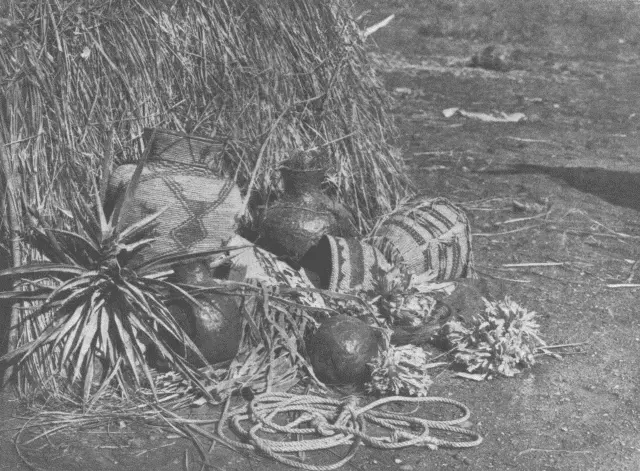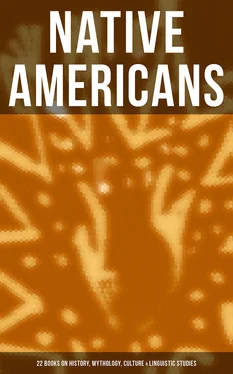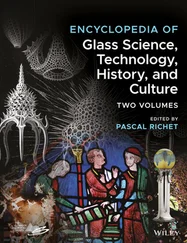There was a time when nothing existed to form the universe—no earth, no sky, and no sun or moon to break the monotony of the illimitable darkness. But as time rolled on, a spot, a thin circular disc no larger than the hand, yellow on one side and white on the other, appeared in midair. Inside the disc sat a bearded man but little larger than a frog, upon whom was to fall the task of creating all things. Kútĕrastan, The One Who Lives Above, is the name by which he is now known, though some call him Yŭádĭstan, Sky Man.

Apache Still Life
Kútĕrastan, as if waking from a long sleep, sat up and rubbed his face and eyes with both hands. Then bending forward, he looked up into the endless darkness, and lo! light appeared everywhere above him. He then looked down, and all below became a sea of light. A glance to the east created yellow streaks of dawn, another to the west the saffron tints of the dying day, both soon becoming obscured by numerous clouds of many hues, formed by his looking around and about in all directions.
Again with both hands Kútĕrastan wiped his eyes and sweating face and, rubbing his hands together as if he were rolling a small pebble between the palms, suddenly parted them with a quick downward fling, and there before him on a shining, vaporless, mirage-like cloud sat a little girl no larger than a doll. Kútĕrastan directed her to stand up, asking where she intended to go, but she replied not. He cleared his vision once more with his hands, then proffered his right hand to the girl, Stĕnátlĭhăn, Woman Without Parents, who grasped it, with the greeting "Whence came you?"
For reply Kútĕrastan merely repeated her question, adding, "Look to the east, it is light! There will be light in the south, in the west, and in the north." And as she looked she saw light. He then came out upon the cloud.
"Where is the earth?" asked Stĕnátlĭhăn, to which Kútĕrastan replied by asking:
"Where is the sky?" Then requesting that he be not disturbed, he began to sing: "I am thinking, thinking, thinking, thinking what shall I do next." Four times he thus sang, at the end of the fourth time brushing his face with his hands, which he rubbed briskly together and parted quickly; and there before him stood Chuganaái, the Sun. Raising his left hand to his brow, from the sweat thereon, which he rolled in his hands as before, Kútĕrastan let drop from his right palm a small boy, Hádĭntĭn Skhĭn.
The four sat upon that still cloud for a time as if in reverie, the first to break the silence being he who commenced the creation: "What shall we do next? I do not like this cloud to live upon, but we are to rule and must stay together. How dreary it is here! I wish we had some place to go." And then he set to work again, creating Nacholécho, the Tarantula, who was later to help in completing the earth, and Nôkusé, the Big Dipper, whose duty it would be to befriend and to guide. The creation of Nĭlchídĭlhkĭzn, the Wind, Ndídĭlhkĭzn, the Lightning Maker, and the clouds in the west to house Ndísâgochan, Lightning Rumbler, whom he placed in them at the same time, next occupied his attention. Then turning to Stĕnátlĭhăn, Kútĕrastan said, "Truly this is not a fit place in which to live; let us make the earth." And so saying he at once began to sing, "I am thinking of the earth, the earth, the earth; I am thinking of the earth," which he repeated four times. As he ceased, Stĕnátlĭhăn, Chuganaái, and Hádĭntĭn Skhĭn each shook hands with him. Sweat from their hands adhered to his. He at once began rubbing his palms, when suddenly there slipped from between them a small brown body, no larger than a bean. Kútĕrastan kicked it and it expanded; Stĕnátlĭhăn then kicked it and its size further increased; Chuganaái next gave it a severe blow with his foot and it became larger still; a kick from Hádĭntĭn Skhĭn made it greater yet. Nĭlchídĭlhkĭzn, the Wind, was told to go inside and blow outward in all directions. This he did, greatly expanding the dimensions of that body, now so wide that they could hardly see its edge. The Lightning was next directed to exert his strength, so with a terrific flash and roar he penetrated the body to its centre, spreading it still wider. Then Tarantula was called on to assist, and accordingly he started off to the east, spinning a strong black cord, on which he pulled with all his might; another cord of blue was spun out to the south, a third of yellow to the west, and a fourth of glistening white to the north. A mighty pull on each of these stretched the surface of that dark brown body to almost immeasurable size. Finally Kútĕrastan directed all to cover their eyes with their hands, and when they opened them a moment later they beheld Nigostú̆n, the Earth, complete in extent. No hills or mountains were there in sight, nothing but a smooth, treeless, reddish-brown plain.
Nĭlchídĭlhkĭzn, the Wind, scratched his chest and rubbed his fingers together, when out from between them flew Dátĭlyĕ, the Humming-bird. Dátĭlyĕ was told to make a circuit of the earth and report what he saw. He started off toward the east, circled south, west, north, and back from the east. All was well; the earth was most beautiful, very smooth, and covered with water on the western side.
But the Earth was not still; it kept shifting and rolling and dancing up and down, so Kútĕrastan made four great posts—colored black, blue, yellow, and white—to support it. Then he directed Stĕnátlĭhăn to sing a song. She sang, "The world is made and will soon sit still." These two then stood and faced Chuganaái and Hádĭntĭn Skhĭn, when into their midst came Nĭlchídĭlhkĭzn, who dashed away to the cardinal points with the four posts, which he placed under the sides of the earth; and upon them it sat and was still. This pleased Kútĕrastan, so he sang a song, repeating, "The world is now made and sits still."
Then Kútĕrastan began another song, referring to the sky. None existed as yet, and he felt there ought to be one. Four times he chanted the song, at the end of the fourth time spreading his hands wide before him, when lo! there stood twenty-eight men and women ready to help make a sky to cover the earth. He next chanted a song for the purpose of making chiefs for the sky and the earth, and at its close sent Ndídĭlhkĭzn, the Lightning Maker, to encircle the world. Ndídĭlhkĭzn departed at once, but returned in a short time with three very uncouth persons, two girls and a boy, whom he had found in the sky in a large turquoise bowl. Not one of them had eyes, ears, hair, mouth, nose, or teeth, and though they had arms and legs, they had neither fingers nor toes.
Chuganaái at once sent for Doh, the Fly, to come and erect a kaché̆, or sweat-house. It took but a short time to put up the framework, which Stĕnátlĭhăn covered closely with four heavy clouds: a black cloud on the east, a blue one on the south, a yellow one on the west, and a white one on the north. Out in front of the doorway, at the east, she spread a soft red cloud for a foot-blanket after the sweat. Twelve stones were heated in a fire, and four of them placed in the kaché̆. Kútĕrastan, Stĕnátlĭhăn, Chuganaái, and Hádĭntĭn Skhĭn each inspected the sweat-house and pronounced it well made. The three newcomers were bidden to enter and were followed by Chuganaái, Nĭlchídĭlhkĭzn, Ndídĭlhkĭzn, Nôkusé, and Doh. The eight sang songs as their sweat began. Chuganaái led, singing four songs, and each of the others followed in turn with the same number. They had had a good sweat by the time the songs were finished, so Stĕnátlĭhăn removed the black cloud and all came out. She then placed the three strangers on the red-cloud blanket, and under the direction of Kútĕrastan made for them fingers, toes, mouth, eyes, ears, hair, and nose. Then Kútĕrastan bade them welcome, making the boy, whom he called Yádĭlhkĭh Skhĭn, Sky Boy, chief of the sky and its people. The second he named Nigostú̆n Nalí̆n, Earth Daughter, and placed her in charge of the earth and its crops; while to the third, Hádĭnĭn Nalí̆n, Pollen Girl, was assigned the care of the health of the earth's people. This duty also devolved upon Hádĭntĭn Skhĭn, but each looks more to the welfare of his own sex than to that of the other.
Читать дальше













